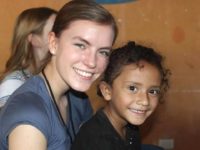![]() Africa is the world’s second-largest continent, and it used to exist on the fringe of my consciousness. I knew about the Sahara, the 1985 Live Aid concert and the third season of Survivor, which demonstrates that I judged Africa to be inconsequential – although I did recognize apartheid as “something” significant. Ashamedly, the latter didn’t affect my behavior in any way.
Africa is the world’s second-largest continent, and it used to exist on the fringe of my consciousness. I knew about the Sahara, the 1985 Live Aid concert and the third season of Survivor, which demonstrates that I judged Africa to be inconsequential – although I did recognize apartheid as “something” significant. Ashamedly, the latter didn’t affect my behavior in any way.
On April 6, 1994, in a country the size of Maryland, but with New York City’s population stuffed into it, friends and business associates began killing one another indiscriminately. Neighbor butchered neighbor. More than 1 million people were exterminated in 100 days and another 2 million fled the country.
In a country identified as 90 percent Christian, Christ-like behavior essentially vanished as children and babies were hacked apart with machetes. What happened to God? Where was He?
In pre-colonial times, Rwanda’s three ethnic groups established a system of exchanged labor, which was exploited by the Belgian colonial administration. When Rwanda gained independence in 1962, the colonial legacy of division led the Hutu and Tutsi, the two main ethnic groups, to periodically kill each other for the next four decades, fueled a diaspora, and culminated in the genocide.
In 2006, 12 years after the Rwandan president’s plane was shot down on approach and setting off the killings, a quiet tarmac greets me at the Kigali airport. The sun is bright and the sky is clear, but the air seems mournfully still.
A rush of passengers arrives at Customs, disrupting my perception of Rwandan life like dust swept into the air. I’m not ready for the bustle. I want a moment to grieve what happened, to honor the pain and ask forgiveness for my indifference. So I withdraw toward the wall to watch the crowd swarm about.
Conversations buzz the room, and a group of Rwandans begin to queue. I stare at them with a glazed mind, lost in my thoughts.
A few days later, a copy of The Purpose Driven Life sits on Mayor Vianney Murego’s desk, tempting me to ask a question about it, to turn the conversation to why I’m in Rwanda, which is precisely why I ignore it.
I came to Rwanda to savor God’s love. Like coffee, which the country’s volcanic soil produces, God’s love can be found in other places, and given its past, Rwanda may seem an unlikely place to experience God. However, soil infuses its fruit with a distinctive flavor, and Rwanda’s sorrow-laced soil, watered with innocent blood, produces a grateful love in its people – a love rich with overtones of mercy and grace.
I learn that life after Hotel Rwanda – after the genocide – is about chronic water and power shortages. A lack of industry and a decimated infrastructure combine with an overpopulated, overworked land, leading most observers to conclude that there is no hope for the future.
But Mayor Murego disagrees.
With carefully chosen English and a survivor’s conviction, Mayor Murego explains that only forgiveness promotes healing; hanging onto pain doesn’t. And his weary country wants to move forward.
He mentions the gacaca courts, traditional community courts set up to speed the genocide trials along and reduce the burden on the conventional court system.
Suspects with nonleadership roles in the planning and commission of atrocities are tried in their communities, which helps foster healing by addressing the remaining fears on both sides of the process and helping dress the lingering emotional wounds.
The open, community-rendered justice helps cleanse the soul, allowing forgiveness to take root, which means Rwanda’s future is brighter than even the most optimistic foreigner may imagine.
The government expects the country to be a leader in Africa someday, and not in the distant future, but soon. They’re planting their hope and building their future on the rock of faith. Faith in God, and faith that only Rwandans live today, that the distinction between Hutu and Tutsi died 15 years ago, and Rwanda is a nation forgiven and redeemed.
Where was God during the Rwandan genocide?
He was there. But not only there, He is wherever the question is asked, whenever it is asked.
I recognize the genocide as an atrocity – as wrong, unjust and devastating – because the light of Christ illuminates the darkness.
Without Christ, Rwanda, Sept. 11 and Darfur are unrecognizable. Christ shares His sorrow on the cross,
“Eloi, Eloi, lama sabachthani?”
“My God, my God, why have your forsaken me?”
Then He shares His joy, and asks us, “Where were you? Where ARE you now? Here I AM. Come to me.”
Where was I?
During the 100 days of slaughter, I was immersed in myself. I had not a glimmer of Christ. Eleven years passed before I became aware of the Rwandan genocide, and the question now is “Where is my hope?”
It’s where it’s always been, even when I didn’t know it.
“Once you were alienated from God and were enemies in your minds because of your evil behavior. But now he has reconciled you by Christ’s physical body through death to present you holy in his sight, without blemish and free from accusation.” – Colossians 1:21-22 (NIV)
This post was inspired by my time in Rwanda in October 2006. I traveled to Nyabikiri, a community in the Gatsibo District of Rwanda, while on a mission trip.







14 Comments |Add a comment
During the Armenian Genocide of 1915-1923, 1.5 million Christians were slaughtered at the hands of Muslim Turks. The Turks were not punished, they continue to reap the benefits of stolen land and property to this day. Why has God not punished the country of Turkey for their crimes after nearly a century of lies about it? Armenians were among the first Christians, and yet it seems like God turns a blind eye toward them. When Armenia was pagan in ancient times it was a mighty empire, now it is reduced to a mere shadow of its former glory. Why is this? If God is supposedly all-powerful, all-loving and all-good, how can this not just happen but go unpunished? And how about the Rwanda genocide, will that be forgotten for a century as well?
@Eric – You are very right in somethings. Such as the idea of the big bang theory. If it did happen, someone had to start it. From what I’ve studied, you would be classified as a Deist, not an atheist. However, I won’t be arguing with you on scientific theories, or even the religious ones.
I know very well how if feels to be hurt and frustrated to see and feel extreme injustices in the world and wonder how anyone who loves any one can stand by a let it happen. In a sense which I’d rather not go into, I have been that 4 year old…I just want you to know, that during the most defenseless time in my life, when horrible things happened, it was not my God who did it…and yes, anyone of us who sees or experiences terrible injustices has to wonder even though He didn’t cause it, why didn’t He stop it? For all of the other circumstances in the world, I cannot say. I do not know. For my own, I learned later in life, that God knew that I could survive my disaster and heal with what I had been provided in my life, but a younger, very close friend, who came through the same experiences had no one to catch her, and needed someone who knew the absolute love and healing power of God to carry her through. I was blessed to be that one. And also, during my most vulnerable moment, I can look back and see that God held me closest then. While He allowed me to be shaken, chipped, injured, He did not allow me to be crushed, and He protected me, like a mother bear over her cub, until I could spiritually walk again.
I have no doubt that God could, in an instant, halt my suffering, halt Lilin and Alok’s suffering… but where would we be as humanity then? We are selfish enough, without being coddled. If no one was ever injured or wronged, no one would ever find compassion for another person. We live as relational beings, and usually if we cannot relate to something, such as pain someone else might be suffering, (in my experience), we simply ignore it, for lack of a better idea to handle it. We are comfortable beings…even those of us living in poverty. There have been articles on people who are unwilling to reach out and take a step towards bettering their lives, because they have grown comfortable with what they know.
Comfort, rather than be a blessing, at times, can be man’s worst enemy. A comfortable person has never changed the world… for good or bad.
That’s all the pertinent stuff I have to say about it. Agree or don’t, it doesn’t bother me.
I only want to conclude with this: Eric, originally, all I was going to say in response was, “Man, that’s gotta suck.” And I imagine it might, or perhaps you have grown comfortable with a god who doesn’t care. I’m sorry. All I know is that, believe it or not, my Jesus still loves you as much as He does me: more than there are drops of water in all of the seas…even when I misbehave.
I also want to apologize in advanced for anyone who decides to jump down your throat for voicing your thoughts. People shouldn’t be afraid to share what is on their minds…especially among Christians.
Suren, I hope others will weigh in with their responses, as well, but I can’t let your comment go.
The fact is, God has never once answered my “Why?” questions. He has answered other questions, sometimes directly and immediately, and sometimes only over time: questions such as “What can I learn of you, in this?” Or “What do you want to teach me?” Or “How do you want to use me…” in restoration, prevention, or other ways, to mitigate evil where I can.
I don’t know where you are, but if possible, look for a copy of “Where Is God?: Finding His Presence, Purpose and Power in Difficult Times,” by Dr. John Townsend. I’m positive you can find used copies online, if you have the means to do that. One of the first statements the author made that encouraged me is that, when we face difficulties, tragedies, disasters or other challenges, “Where is God?” is exactly the right question for us to ask. We need most of all to seek Him out, in those times, or we sink like a rock.
Over and over, the Psalmist asked the same questions you have asked: Why have the workers of evil gone unpunished? When will God act in retribution for His people? When will you rescue me? He even demanded that God kill his (David’s) enemies! In the rest of the Bible, God speaks to us, but in the Psalms, He has given us a voice to speak to Him–the words, the angst, the emotions, the praises and the despair. Find the Psalms that speak most to your questions and pray them, opening your heart to hear Him. And remember that, one Day, God will exact justice for all of His people, whenever they lived and died, and vengeance against every evil-doer. Oh! I want to be on His side, following Christ to the best of my ability, every day of my life!
The answer is simple, “there is no God” at least your kind of God. Christians, Muslims and Jewish preach about a one God, who is compassionate and caring and engaged in our lives. Let ask you all, what criteria does God uses to determine who dies and who lives? Why would God subject a 4 year old under extreme pain in one continent while the other is warmed and fed and protected? The answer, the way organized religions portay God today is simply true. You all probably thinking that I am an etheist, well I m not. I believe in god, reason being that even though i believe in big bang theory and many scientific researches, someone or some force created the universe. I interpret that as god, However I don’t consider this god to be involved or even caring about our day to day lives as we humans believe.
It’s so easy NOT to think of things happening so far away from us.
Thank you for a great introduction to this topic this week.
@Kees Boer – Kees, until we were in DR, in October, I had feared that one of my girls might be sexually abused by her father and, perhaps, her older brothers. The project worker I talked with did not know of any such occurrence, however, although there was other abuse in the home.
I certainly don’t have the answers to why this happens. I believe from my understanding in the Scriptures that the children are going to heaven, that died that young. Forgiveness is vital also to not let it continue. With foregiveness, the geonicide would probably never had happened. Some were not forgiving towards others. It’s a difficult topic. I was confronted with it about a month ago, when I found out that one of my Compassion children had been sexually abused by her stepfather. I had to forgive him and it was difficult, because the little girl is very very dear to me. Now, I hope that somehow she will be able to use it in the future to help other children.
Kees
I didn’t even know Rwanda existed at the time of the Genocide (well, me being 5 at the time might have something to do with that, but I’m sure if I was an adult at the time, I would have been just as ignorant).
I recently started sponsoring a boy from Rwanda, and he was born in 1996. If he was born 2 years earlier…well, I shudder to think of the possibilities.
I suggest you all read Shake Hands with the Devil, by my fellow Canadian, Romeo Dallaire. He was in charge of the UN mission to Rwanda during most of the genocide, and this book is his account of those terrible days.
Wow, this is intense, especially the part that said “suspects with nonleadership roles in the planning and commission of atrocities are tried in their communities”…Can you even imagine if your neighbor, who killed your family, sat on trial right down the street? To forgive something like that is entering deep waters – only Christ can inspire that kind of forgiveness.
If anyone is interested in reading more about the Rwandan Genocide, then there is an excellent book called “Left to Tell” by Immaculee Ilibagiza. She survived the Rwanda genocide in 1994 along with seven other women by hidding in the cramped bathroom of a local pastor’s house for 91 days!
She writes a lot about the power of prayers and the importance of forgiveness.
geri
Thanks Chris, I too must admit that I thought very little of the genocide in Rwanda until I went there with Compassion in May of 2001. I believe that God is doing a great work in that country because He is mending the broken hearted and comforting those who were so visciously abused. And Compassion had been at the forefront through the years. It is true that those who are forgiven much will be a strong force for justice and mercy toward others.
Chris, Thank you for this post. I have been sponsoring a young boy in Rwanda for the past ten years. Rwanda and its people hold a special place in my heart. I would encourage the viewing of the film Beyond The Gates, filmed entirely in Rwanda. It is a powerful film which deals with the genocide and asks the same question….”Where was God in all of this? I highly recommend it. Thank you again Chris for this post.
Wow!!! I didn’t realize it was so many people were killed in such a short time!!!
I Peter 5:7 “Cast all your anxiety on Him because He cares for YOU!!!”
Chris, I cannot tell you how timely this piece is, for me, or how badly I need the grace that Christ offers to me, to all of us, right now. Not for things present, but for things past and long-since forgiven.
As for your post, like you, I was in my own world during the 100 days. I may have seen some mention of the genocide in Rwanda in the news, but it meant nothing to me. I was wrapped up in student teaching and had no room for Africa or much of anything else. God in His mercy has opened my heart and my eyes.
Thank you for sharing this post.